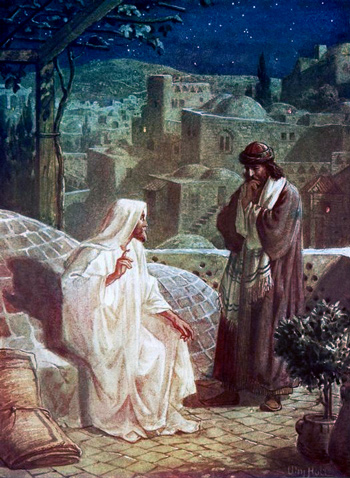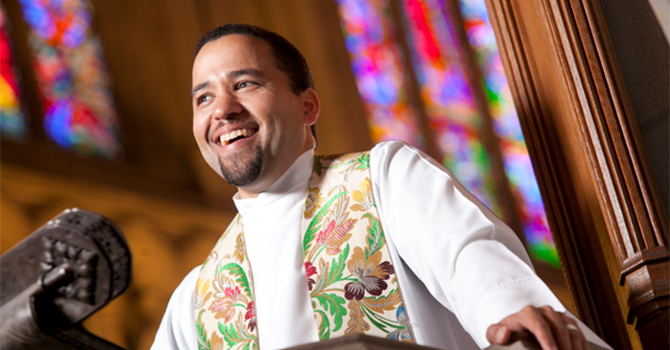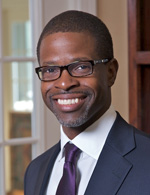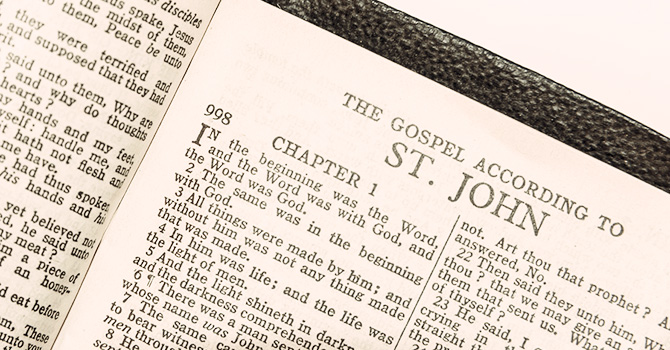Update: Will Campbell died June 3, 2013.
Genesis 12:1-4 ; Romans 4:1-5, 13-17; John 3:1-17
Editor’s note: Faith & Leadership offers sermons that shed light on issues of Christian leadership. This sermon was preached on March 24, 2011, in Goodson Chapel at Duke Divinity School.
My friend Will Campbell, the iconoclastic Baptist preacher, tells a story about when his daughter Bonnie asked him to baptize her two-year-old son. Will and the family are Baptists, and since Baptists don’t baptize infants, Will had a problem. Not wanting to create conflict with his father, who for 60 years had been a Baptist deacon, Will felt the need to consult him.
So he went to his father and asked, “Daddy, do you believe in infant baptism?” His dad responded, “Believe in it? Why, son, I’ve actually seen it!”
I called Will last night and told him I was going to use him in a sermon this morning. He said, “Well, you could do worse.” Recalling that story, I said, “Could you tell me any more about it?” He said, “When I went to my father with a question, I always got more than I bargained for. I just wanted a ‘yes’ or ‘no’ answer from my daddy. Instead, he gave me a paradox about seeing and believing.”
So he has seen infant baptism. Does that mean he believes it? Or does believing in it enable him to see it? It’s that dialectic that is at the heart of the encounter of Nicodemus with Jesus.
The questioners who went to Jesus always got more than they bargained for. That’s especially true in John’s Gospel. If you’re looking for simple “yes” and “no” unambiguous answers, don’t go to John. The answers are always ambiguous. There is always a subtext. There is always another way of viewing it. And if you get locked in too quickly, you’ll miss it. There’s always more going on than meets the eye.
But such is the nature of faith; such is the encounter with this one we call Jesus. You always get more than you bargain for when you encounter him. Just ask Nicodemus, who went with a simple inquiry. Out of what motive? Who knows for sure, but he had at least an intellectual curiosity about the signs Jesus performed, which raised questions about Jesus’ identity.
We come here this morning with all kinds of questions rumbling around in our minds, some intellectual curiosity I hope, and perhaps a secret or even a public longing to meet and know more deeply this one we call Jesus.
Let’s join the conversation between Jesus and Nicodemus. We might get more than we bargained for when we came to chapel this morning. We just might encounter Jesus on a deeper level, because we can be sure that he will always push us or woo us or challenge us to go deeper, broader.
So Nicodemus approaches Jesus with an underlying question. Or not really a question. He’s observed the signs, and apparently he wants to know a little more about this one who is performing the signs. So he approaches Jesus. Maybe he’s silently longing for an encounter with God. We don’t get the motive particularly. But put yourself in his situation and see.
Who is this Nicodemus? Well, he’s educated, like we are. He’s prominent. He’s successful. He’s experienced, maybe my age. He’s a person of more than adequate financial means. He’s well-known. He’s an interpreter and judicator of the Torah and the tradition. He’s one who has a significant level of control, both over his own life and the lives of other people. He has put life together in a way that has worked for him. Life is good for Nicodemus, apparently. He’s secure, and he’s old, or at least he identifies himself as such: “How can a man who is old be born again?”
I’m asking that question myself. You’re not there yet, most of you. But that means he has more memories than dreams. He’s got more reflections on ministry than anticipations of ministry. He can draw on his broad and deep experience and rely on it entirely if he so chooses.
Do you identify at all with him? Probably not, at your age. But most of you are privileged. You’ve got life under control, pretty much, at least before exams. And so life is good. Nicodemus is part of the privileged class. He is recognized in public. He has a public position, and he comes by night. Why does he come by night? Some would suggest it’s because he’s afraid. I doubt that. At least he was around when the disciples weren’t, at the crucifixion of Jesus. Perhaps he wants a private conversation with Jesus. He doesn’t want to be distracted by somebody coming and interrupting the conversation. After all, they might say, “Let’s listen in on this conversation between this famous teacher and Jesus.” But, as you know, in John there’s always a double meaning, and there’s always this play on images of light and darkness.
John is giving us a hint of the subtext when he says that Nicodemus came by night. This teacher, this leader, this prominent one in control is still in the dark. He’s still got a lot of the shadows in his own life. He doesn’t have it all together as much as he thinks he has it together.
He begins the conversation with a compliment -- a good pastoral move, a good pedagogical move: “Rabbi, we know that you are a teacher come from God, for no one can do these signs that you do apart from the presence of God.” He’s been attentive. He’s listened. He’s watched. But Jesus responds without being distracted by his praise or his compliments. (The prayer that I have prayed almost every day of my ministry has been, “Oh God, do not let me be unduly distracted today by praise or criticism.”)
Jesus is not distracted by Nicodemus’ praise or taken off course. Rather, Jesus refuses to be seduced by it and says what seems to be out of the blue; Nicodemus doesn’t ask anything about the kingdom of God directly (“I’ve been watching the signs. I want to know about the signs. Tell me about miracles”).
And Jesus says, “No one can see the kingdom of God without being born again anew from above.” The Greek word is anothen. And there is the ambiguity again. Read the footnote in your Bibles. Some translations say “born again.” Others will read “anew” or “from above.” Should I dare venture a translation with Dr. Marcus, Dr. Hays and Dr. Campbell present? Would it be okay to include both of the translation possibilities? “No one can see the kingdom of God without being born anew from above.”
These signs that you’ve been seeing -- you may be missing them, because there’s something that has to happen before you can actually see the true signs. You get all confused by your analysis of the signs if you don’t have something else. Unless you are born anew from above, what you see will be misinterpreted.
Suddenly the theological discussion moves into deep waters. It moves from the head to the heart, if you will, beyond talking about miracles and signs to a whole new order of things. And here the phrase or image of the kingdom of God comes up in John. In John? Such language dominates the Synoptics, but it is not the usual language of John. It is, however, the language of Jesus.
“I’m introducing you, Nicodemus, to something that transcends your curiosity. You’ve come asking for a sign to help you control your life more, perhaps, or to validate what you already know. I want to put you in touch with a whole new world. I want to turn your world upside down to where you will see reality as it really -- I mean really -- is. It is a world totally out of your control. You’ve got to be born again, anew from above, if you are to enter that new world.”
Jesus confronts him then with a whole new possibility. And it requires more than intellectual curiosity, even an M.Div. degree and a Ph.D. It requires a radical reorientation of life without which we will misinterpret the signs and we will miss the real signs. You can’t see it unless you are born anothen, from above, again, anew.
So immediately Nicodemus has his darkness exposed. He hears only the literal, one-dimensional interpretation of anothen, born again. And how can a man be born when he is old? A preacher of another generation said that Jesus turned water into wine, opened the eyes of the blind, even raised the dead, made the lame to walk; but there is no miracle in which he made an old man young. (I’m waiting for that miracle.)
Or is there? Ask Abraham and Sarah. Abraham, 75 years old, in retirement, becomes a father. Now that’s a miracle I’m not waiting for. Grandfather is fine. Been there, done that. In old age, set out in search of a new land? Not even knowing where it is? Being a father of a whole people? Being held up by Paul as a model of faith? What do you mean, there is no miracle of God making an old man young? Just look at Sarah. An old, barren woman made fertile. Now, that’s anothen, being born anew from above.
You think God can’t take one locked in a system of control, where life has become predictable and manageable, and turn everything upside down, inside out? Do you believe that God can’t transform a person so confident in his own system of belief that he expects everyone else to conform to his expectations and is even willing to coerce and persecute those who don’t fit into that system? You think God can’t transform the criminal mindset, even a Middle Eastern terrorist? Just ask Saul of Tarsus. That’s anothen, being born anew from above.
Jesus says to Nicodemus, “Unless one is born of water and the Spirit, he cannot enter the kingdom.” In other words, this isn’t a birth you create, just as you didn’t create your original birth either. It’s something God does, being born from above. It’s like the wind. You can’t create it. You can’t control it. Sometimes it comes like a gentle breeze caressing your fevered brow. Or it may come as a sirocco blowing across the desert, picking up moisture as it crosses the waters. It may come as a whirlwind or it may come as a tornado, shaking the very foundations of life and leaving life in shambles and rubble.
Nicodemus understandably asks, “How can these things be? I don’t understand. It doesn’t fit into my system and experience.” Jesus responds, “Are you a teacher of Israel? Yet you do not understand these things?” Could it be that Nicodemus’ scholarship, his privilege, his success, his prominence, his control, his security had become blinders to God’s mysterious transforming presence in the world?
Maybe Jesus would say to us, “You mean you’ve had CT 32, you got an A on your Christology paper -- and you don’t get it? You even took the Greek exegesis of John, and you don’t get it? You mean you’ve studied Barth and read all the volumes of “Church Dogmatics” and are so tied to orthodox theology that you can’t see God acting outside of that system? You mean you’ve been in ministry for 50 years, even a bishop of the church and now a professor, and you don’t get it?”
From my own experience across the years, it is much easier for those languishing in prison or those who are addicted or those prodigals who find themselves waking up in a pigpen in a far country to understand what Jesus is saying to Nicodemus than it is for those of us who have reduced life to what we can control. It’s easier for them to believe in being born anew from above than we who think we have it all together. And here we get to the point of the signs.
Jesus says, in effect, “You’ve been given the sign. It’s there in the Torah.” It’s there. You know it. You’re a teacher. You know it. You’ve just missed it.
Remember that time when our forebears in the desert were threatened by those poisonous serpents? Do you remember the sign? What was it? It wasn’t running all the snakes out. It was taking a snake on a pole. Moses lifted up a pole with a serpent -- a pole, a sign -- and the people were saved. God took the very sign of threat and death -- a serpent -- and made it a means of liberation and healing.
And here’s the good news: God’s doing it again. God is about to do it again. You remember that image of the Son of Man? Now, Nicodemus, you’ve studied the Torah. You know it’s there. This God/Man that we anticipate, this Son of Man, has moved into the world filled with all kinds of serpents and creatures of death and will be lifted up on a pole -- and the world will be saved. God has moved into the suffering, the death, the out-of-control principalities and powers of this world. This Son of Man will be lifted up on a pole as a sign, a means, to new life, anothen.
Then it is as though John can’t contain himself any longer, and the preacher breaks out in a crescendo. The conversation ends and the sermon begins. John just can’t hold it back any longer. So he reveals the whole secret of the gospel, the meaning of all the signs and wonders: “For God so loved the world that he gave his only Son, that whoever believes in him should not perish but have everlasting life. God sent the Son into the world not to condemn the world (even Nicodemus) but that the world through him might be saved.”
Believe that, and you’ll see. Believe that -- I mean really believe it -- bet your life on it, and you will see the signs in the midst of your own and the world’s suffering, loss of control, and even death. And you will be born anothen, anew from above.
“Bishop, do you believe in the new birth?”
Believe it? Why, I’ve actually seen it.


















